Key takeaways:
- Engaging with R’s libraries and community significantly enhances the learning experience and helps in effective data visualization.
- Setting clear learning goals and tracking progress boosts motivation and fosters a rewarding journey in mastering data analysis.
- Practicing with real datasets and building projects is crucial for understanding practical applications of R and improving analysis skills.
- Collaboration in projects not only improves the quality of the work but also enriches the learning experience through diverse perspectives.
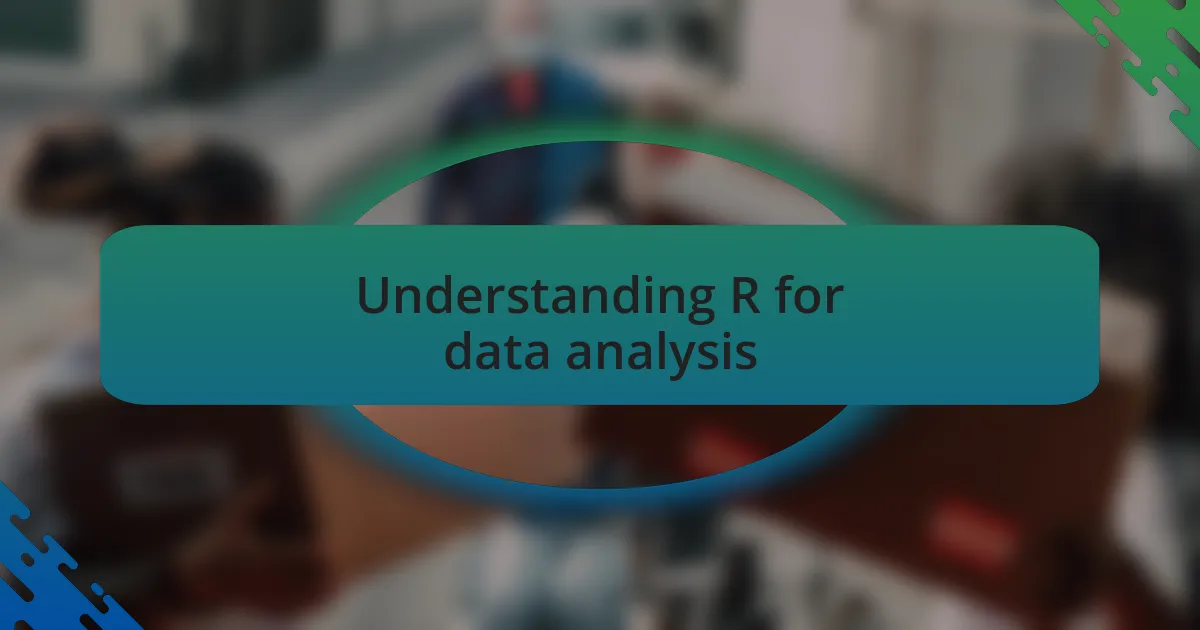
Understanding R for data analysis
R is a powerful language that specializes in statistical computing and data visualization, which is why I turned to it for my data analysis journey. I vividly remember my first experience with R – I was overwhelmed by its syntax at first, but as I dug deeper, I discovered its potential to manipulate large datasets efficiently. Have you ever felt that moment of clarity when a tool starts to click? That’s exactly how it felt when I began crafting my first data plots.
One of the aspects I appreciate about R is its vibrant community and extensive libraries, like dplyr and ggplot2. Engaging with these tools helped me understand not just how to analyze data, but also how to communicate my findings visually. I often think about how much easier these libraries made my learning curve; they allowed me to focus on interpreting results rather than getting bogged down in technicalities.
As I explored R, I encountered various datasets that sparked my curiosity, from environmental statistics to financial markets. Each analysis felt like a mini adventure, and discovering how to apply methods like regression analysis or clustering made the data come to life. Have you ever tackled a dataset that left you feeling accomplished? That thrill of extracting meaningful insights is something I continually chase in my work with R.
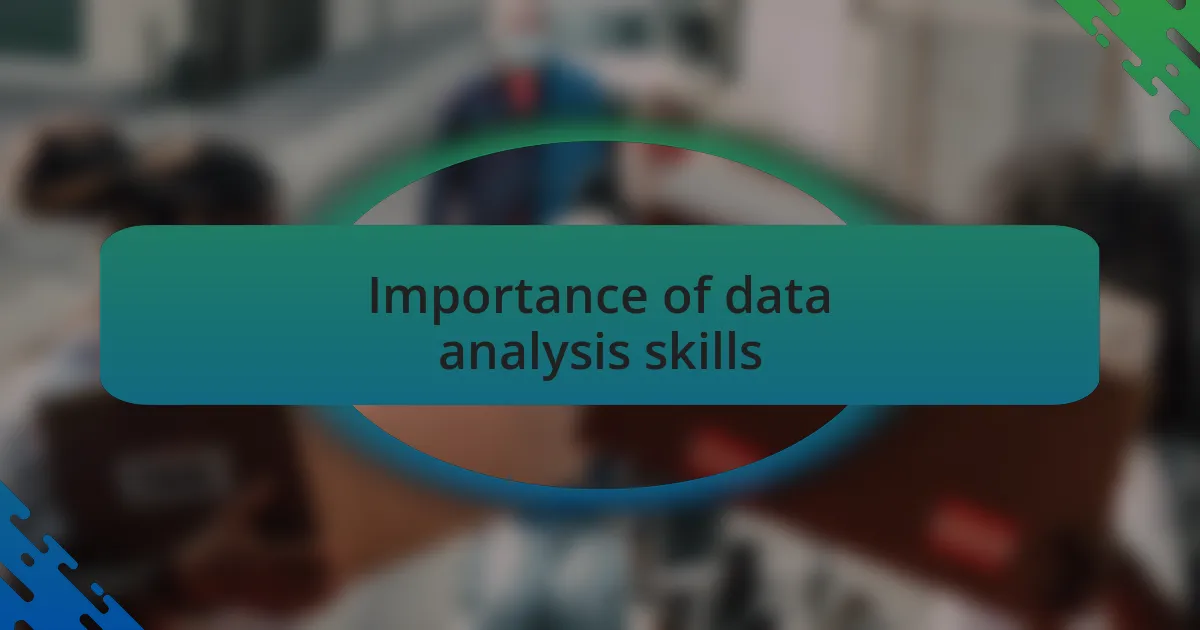
Importance of data analysis skills
Data analysis skills are crucial in today’s data-driven world. I often find myself reflecting on a project I once undertook for a non-profit organization. By analyzing their volunteer data, I uncovered trends that led to a 30% increase in volunteer retention. It was exciting to see how transforming raw numbers into actionable insights made a difference for their mission.
Moreover, the ability to derive meaningful insights from data fosters informed decision-making. I remember a time when I analyzed customer feedback for a small business. The results highlighted key service flaws, enabling the owner to adjust their strategy. Have you ever realized that your analysis could directly influence someone’s business success? That understanding brings a level of responsibility and excitement to the work.
Lastly, data analysis skills enhance one’s career prospects significantly. In my experience, having a strong foundation in data analysis has opened many doors. When I added this skill to my resume, I noticed a substantial increase in job offers. Could it be that the demand for data-savvy professionals is higher than ever? Certainly, in my professional journey, I’ve seen firsthand how valuable these skills can be in differentiating oneself in a competitive job market.
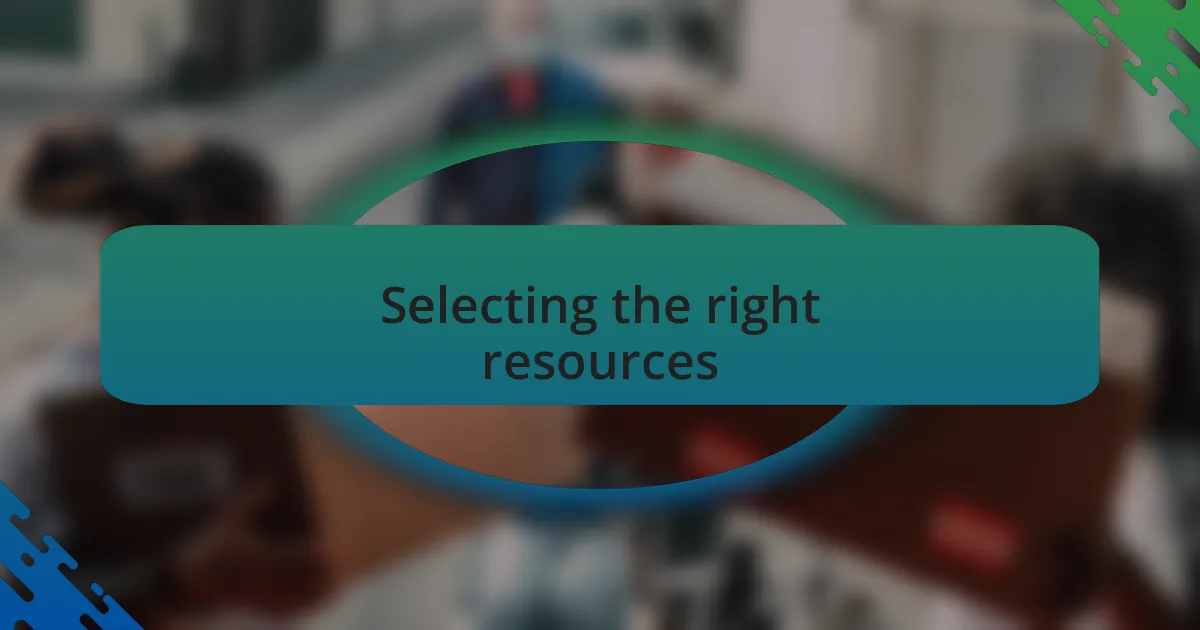
Selecting the right resources
Selecting the right resources for learning R is essential for maximizing your efficiency. I vividly remember my early days, scouring the internet for tutorials that resonated with my learning style. It was a mix of formal courses and community-driven platforms—finding that sweet spot between comprehensive and accessible made all the difference in my understanding.
One key resource that always stood out was online forums like Stack Overflow. I cannot stress enough how beneficial it can be to interact with others who are tackling the same challenges. It often felt like having a conversation with a seasoned mentor, providing insights that no textbook could offer. Have you ever encountered a problem that left you stumped? A quick search in these communities often unveiled a treasure trove of discussions that sparked new ideas and solutions for my projects.
Lastly, I found immense value in practical, hands-on resources, like Kaggle competitions. They not only challenged me to apply what I learned but also introduced me to real-world data sets. Engaging with live data made R come alive for me. It pushed me to think critically and strategically—how can I turn this data into a compelling story? This dynamic approach truly cemented my skills.
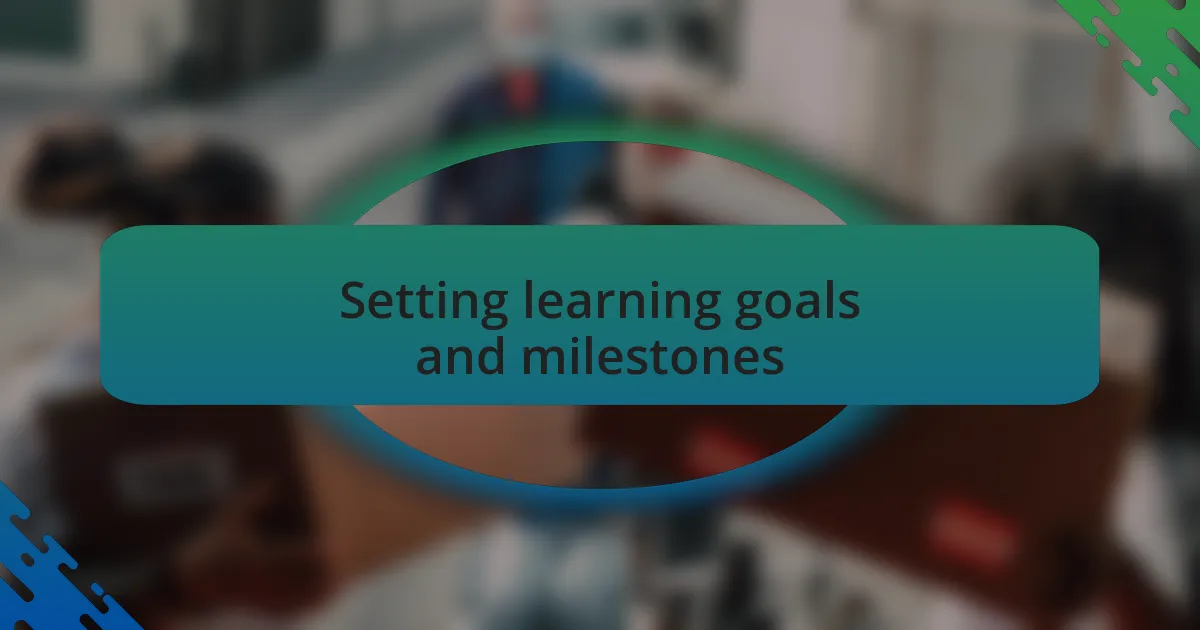
Setting learning goals and milestones
Setting learning goals was a game changer for me. Initially, I felt overwhelmed by the vastness of R and didn’t know where to start. I remember setting a simple goal: to understand basic data manipulation within the first two weeks. Breaking it down into manageable tasks not only gave me direction but also kept my motivation high as I checked each goal off the list.
As I progressed, I introduced milestones that felt more like mini-celebrations. For instance, after successfully completing my first data visualization project, I rewarded myself by sharing my insights with friends. That moment of excitement ignited a deeper passion within me for data analysis. Have you ever experienced that rush of accomplishment? It’s those milestones that kept me engaged, turning what could be a daunting journey into a series of rewarding steps.
Additionally, I found it helpful to track my learning progress visually. I created a simple progress chart where I marked off each skill learned and project completed. Every small victory I recorded added to my sense of achievement. Visual benchmarks made my growth tangible, reinforcing my commitment to mastering R. This method also kept me focused on longer-term goals, steering me toward more complex analyses. How do you measure your progress when learning something new?
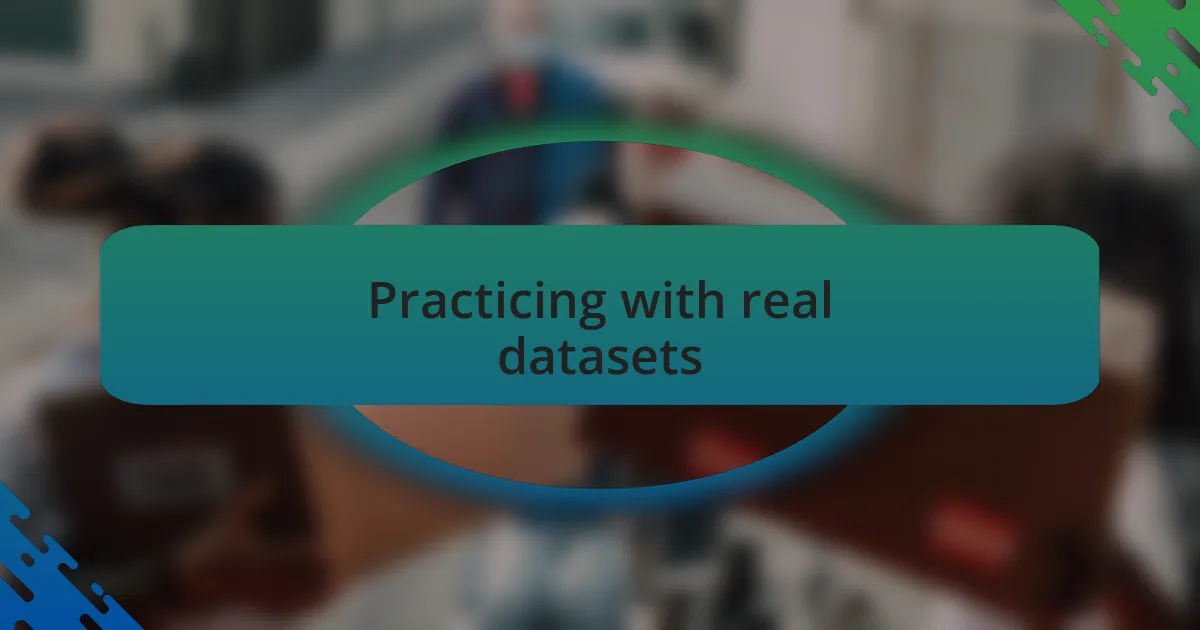
Practicing with real datasets
Practicing with real datasets transformed my understanding of R in ways I couldn’t have anticipated. I vividly recall my first foray into a public dataset on housing prices. Downloading it felt exhilarating—I was no longer just theorizing; I was interacting with real-world data. As I cleaned and analyzed that dataset, the importance of data quality hit me. Have you ever tried to derive insights from messy data? It’s frustrating but so educational.
Diving into real datasets also allowed me to connect theory to practice. For example, while using a dataset on global temperatures, I created visualizations that revealed patterns I had only read about before. This hands-on experience paved the way for more significant projects and gave me a true appreciation for data storytelling. When I shared my findings with peers, their responses ranged from surprise to intrigue. Isn’t it fascinating how data can shift perspectives?
I took my practice a step further by participating in online competitions, which often required using real-world data to solve pressing problems. The thrill of competing pushed me to refine my skills quickly. I remember the moment I submitted my first entry; my heart raced, knowing my analysis would be judged. That blend of excitement and anxiety sparked a deeper commitment to learning. Are you ready to dive into the data pool? There’s so much waiting to be discovered.
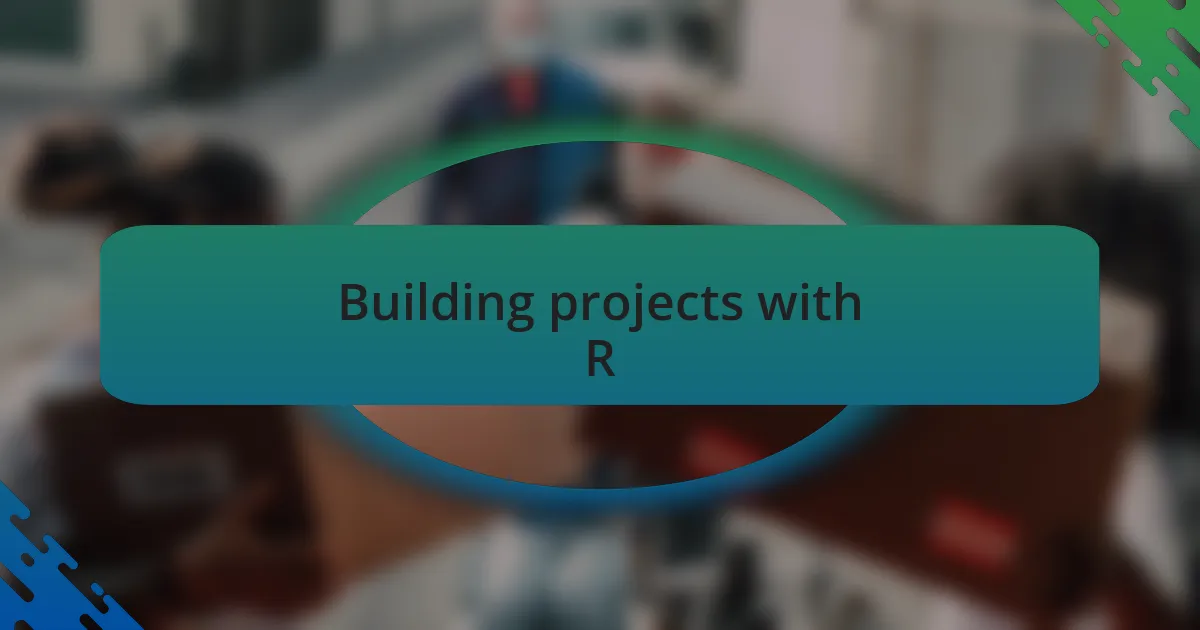
Building projects with R
Building projects with R opened a door to a realm of possibilities for me. I remember embarking on a project to analyze social media sentiment during a major event. As I scraped data using R, I felt a rush of excitement thinking about how to translate raw text into meaningful insights. Have you ever sifted through thousands of tweets to unearth hidden sentiments? It’s like digging for treasure, and the reward comes when you visualize that data into easy-to-read graphics.
One memorable project involved developing a predictive model for stock prices. I set out to predict trends using historical data and various algorithms. I won’t lie; it was challenging to navigate through the different approaches. But the satisfaction of fine-tuning my model to achieve accurate predictions was worth every sleepless night. I often found myself questioning whether I would ever grasp the complexities of machine learning. But with perseverance, I transformed those doubts into valuable lessons and insights for future projects.
I’ve also learned the importance of collaboration in R projects. Working with peers on a data analysis project taught me how diverse perspectives can enhance the final outcome. I still recall our discussions over which statistical methods to apply—the clash of ideas often sparked creativity. Have you collaborated on a project before? It’s a dynamic experience that not only improves your work but also forms connections. Embracing teamwork in R projects truly solidified my understanding of data analysis and its practical applications.
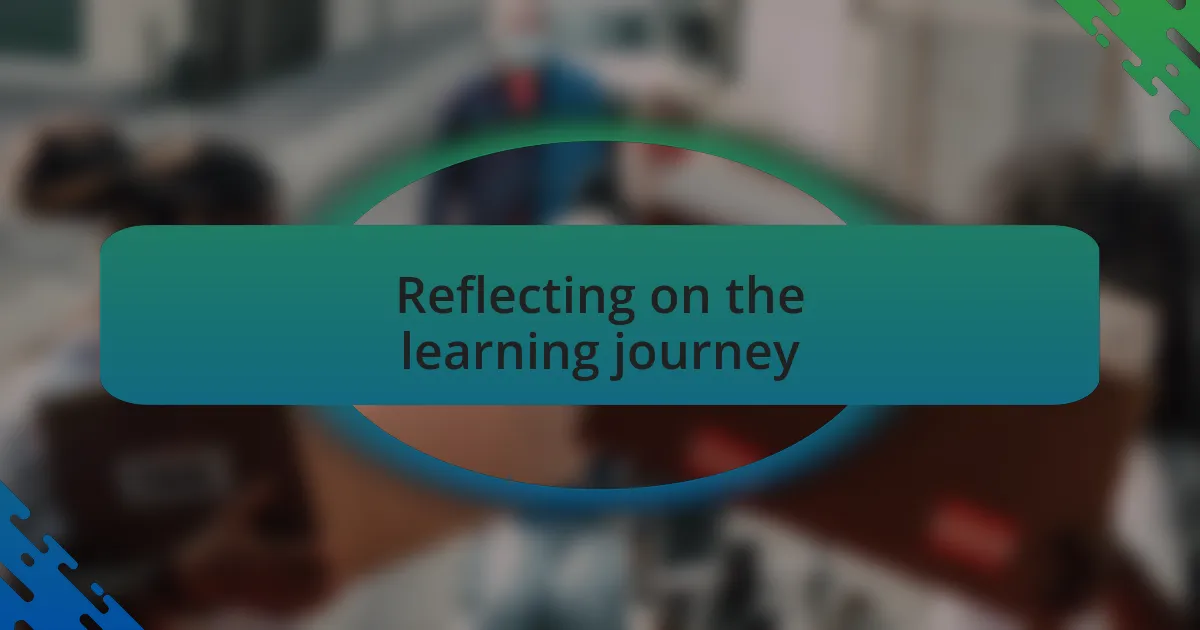
Reflecting on the learning journey
Reflecting on my learning journey with R, I often think about the moments of confusion that ultimately led to breakthroughs. There were days when the syntax felt foreign, and I questioned if I was cut out for this. Yet, each error message became a puzzle to solve, transforming frustration into determination. Have you ever felt stuck in a learning process only to discover that struggle was necessary for growth? I certainly have.
One particularly enlightening experience was when I chose to dive deep into R’s visualization libraries. It was a steep learning curve, but I vividly remember the first time I successfully created an interactive dashboard. My heart raced as I realized how insights could come to life through visuals. The ability to present complex data in an engaging format changed not just my understanding, but also how I communicated findings. Isn’t it fascinating how a single tool can evolve your approach to data storytelling?
As I reflect on the challenges, I recognize that they were essential to my development. Every late night and moment of confusion taught me resilience and problem-solving skills that extend beyond R. When I finally grasped concepts that once seemed insurmountable, the sense of accomplishment felt transformative. Have you ever experienced that rush of clarity after a prolonged struggle? It’s that exhilarating moment that makes every effort worthwhile.